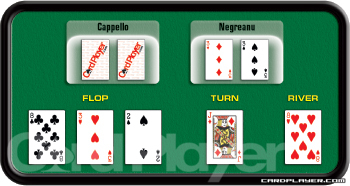Let me start out by saying that I just love the shootout format, and hope to see this type of event catch on worldwide. In a typical tournament, a player who waits patiently is often rewarded by squeaking into the money, but to cash in a shootout, you must be skilled in ring-game play, shorthanded play, and especially heads-up and threehanded play. It would be nearly impossible to fluke a win in a shootout event by winning not only your first table, but then beating out nine other winners, and then after that, beating another full table of players who've just won two tables in a row!
My first table in the shootout at the
World Series of Poker this year was, for lack of a better phrase, a cakewalk. Aside from Blair Rodman, a well-respected professional player, I was dealing with players who seemed to have a limited skill set playing shorthanded. I ended up advancing to the next round, but this time I was up against some tough cookies, most notably, Barry Greenstein, who also won his first table. Barry was eliminated early by another tough player, Rob Hollink, and it came down to Rob, myself, and a young player I'd never seen before, but he seemed to be playing very well.
After playing threehanded for more than an hour, I became more and more impressed with the "new guy," and found out that he'd actually had some success in the recent Wynn Las Vegas tournaments. His friends call him "Bobo," but his real name is Joe Cappello. He looks a lot younger than he is. In today's poker world, you can hardly even call him young at the age of 26!
Anyway, playing threehanded with these two guys was like pulling teeth. I had to fight for every dollar, and traps were wasted when my opponents were too sharp to fall for them. The following hand illustrates why I was so impressed with Bobo's play:
With the blinds at $1,000-$2,000 with a $300 ante, I raised from the button with 3-3. Bobo called, and the flop came 8-3-2 rainbow. Bobo checked, and I decided to bet $5,000. This is a bet I'd make as a cheap bluff, or to induce action. Up to this point, I'd already shown down a few hands in which my opponents could see that I was bluffing on the flop, so I was hoping to get some action from Bobo if he had flopped a pair. He called.
The turn was a jack, and this time I bet $8,000. Bobo quickly called again. The river was an 8, and Bobo fired out $12,000, leaving himself with just $22,000 remaining. At this point, I'm certain that I have the best hand, as he would have raised me on the turn with two pair, so I moved him all in.
Bobo went into the tank. The first thing that came out of his mouth was, "You only bet $5,000 on the flop." As soon as he said that, I knew that he'd figured it out: That my flop bet signified either strength or a bluff, but for me to raise the river, it had to be immense strength. He went on to say, "I just know I'm beat here, but this would be a pretty sick laydown."
It was obvious by that point that he had trip eights, but for him to consider folding, I figured that he must have a weak kicker. He finally tabled his hand, and folded K-8 faceup! That was a tremendous read, but more importantly, he had the courage to go with his read and give himself a chance to stay alive in the tournament, when most players would have said, "What the heck, I'm pot-committed."
Aside from simply having raw talent and a deep understanding of the game, the reason Bobo was able to figure out this puzzle and make an excellent play was that before he made his decision, like a good detective, he looked at all of the clues available to him. My river raise alone is a big clue, but I could have raised him with trip eights and a weaker kicker. That clue alone wasn't enough. Bobo looked for another clue that essentially ruled out that possibility: my flop bet.
In previous hands when I had raised to $5,000 before the flop, I bet $7,000 or $8,000 on the flop. Now, if I flopped a marginal hand with something like 9-8 or 8-7, I'd likely want to protect it on the flop with a larger bet than $5,000. That $5,000 bet usually signifies the nuts or a cheap attempt to pick up the pot with a bluff.
The hand ended up crippling Bobo anyway, and he went out shortly after that, but my hat's off to him for outplaying me on that hand, and several other hands. You have to give credit where credit is due, and I promise you, this kid can play some poker.










